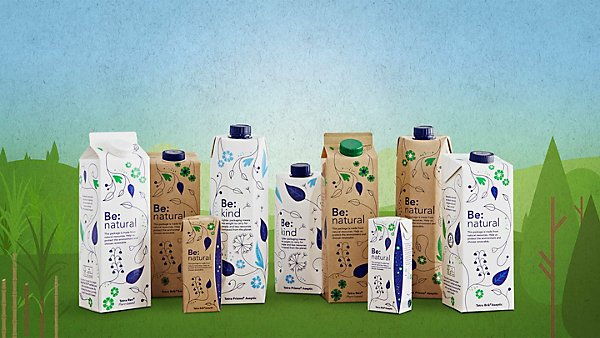Helping to protect forests by responsibly sourcing1 paperboard
The average paperboard content of our beverage cartons is more than 70% which is a renewable material when sourced responsibly. The paperboard we use comes from Forest Stewardship Council™ (FSC™) certified forests and other controlled sources supporting sustainable use of forest resources.
Why responsible sourcing of paperboard matters
As global demand for wood materials increases, it is vital to ensure that sourcing practices protect forests and biodiversity. That's why we source our paperboard only from responsibly managed forests and other controlled sources, certified by the Forest Stewardship Council.
For the manufacturing of carton packaging, we purchase solely a speciality paperboard product called Liquid Packaging Board (LPB). LPB accounts for over 97% of our global wood-based purchases, which also include pallets, crates and office paper.
1Responsible sourcing is one of the strategic objectives for Tetra Pak, reflected in our Procurement Policy. All LPB suppliers are required to comply with the Tetra Pak Business Code of Business Conduct for Suppliers and the Tetra Pak Responsible Sourcing of Liquid Packaging Board Procedure, which together define our requirements in the areas of human rights, labour standards, occupational health and safety, environment, and business ethics.
2The FSC™ license code for Tetra Pak is FSC-C014047.
3Controlled sources are FSC™ controlled wood. This wood originates from low-risk sources that exclude illegally harvested wood, wood harvested in violation of traditional and human rights, wood harvested in forests in which high conservation values are threatened by management activities, wood harvested in forests being converted to plantations or non-forest use and wood from forests in which genetically modified trees are planted. Our FSC™ certified packaging material is produced with the FSC™ claim "FSC™ Mix 70%" which means that minimum 70 % of the wood fibres come from FSC™ Forest Management certified forests and maximum 30 % come from FSC™ controlled wood. More information: https://fsc.org/en/fsc-mix-label-and-controlled-wood
4CDP is a global disclosure system in which companies report how they measure and manage their impacts and opportunities for the areas of climate, forests and water. Each area is scored by CDP based on completeness of disclosure and performance. Source: https://www.cdp.net/en
5The deforestation cut-off date 31 Dec 2020 has been updated to match the updated FSC™ Remedy and Restoration framework, as well as EU regulation on deforestation-free products. Deforestation-free areas are areas where there has been no loss of natural forest as a result of: i) conversion to agriculture or other non-forest land use; ii) conversion to a tree plantation; or iii) severe and sustained degradation.
6We define credible certification schemes as those that are members of ISEAL and compliant with ISEAL Code of Good Practice.
7Defined as at a minimum traceable to the level of primary processor (e.g., to a LPB mill), but preferably to the forest management unit, in line with coming regulatory requirements. Generally speaking, the concept of traceability refers to the tracking of a product throughout its production, processing and distribution phases, from the procurement of the raw materials for its manufacture until it reaches the end consumer.





